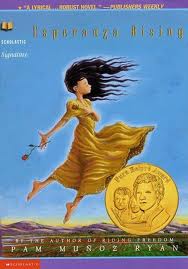Esperanza Rising by Pam Munoz Ryan
Reviewed by Bridget

Ratings Explanation
Violence: Esperanza’s father is killed by bandits. Esperanza sees his body covered in a blanket in the back of the wagon. When the Esperanza’s mother, Ramona rejects an uncle’s proposal of marriage, the uncle arranges to have their home burned down. Esperanza recalls bandits coming to the house, ” six men, their faces covered with handkerchiefs, and they all held rifles.” The strikers put shards of glass in the box of asparagus to cut the women packer’s hand. The strikers also plant “several writhing gopher snakes”, and even an “angry rattlesnake”.
Adult Themes: There is a Mexican saying: ‘Full bellies and Spanish blood go hand in hand.” “Those with Spanish blood who have the fairest complexions in the land, are the wealthiest.” The Mexican peasants travel in a train car filled with trash, reeking of rotting fruit and urine to the United States. Ramona, Esperanza’s mother contracts Valley Fever in California and also has pneumonia. Esperanza is exposed to prejudice for the first time. The other Mexicans in the worker’s camp in California are prejudiced against her, because she came from an extremely wealthy background. The Americans are prejudiced against the Mexicans. “People here think that all Mexicans are alike. They think that we are all uneducated, dirty, poor, and unskilled. It does not occur to them that many have been trained in professions in Mexico.” There are special sections at the movie theater for Negroes and Mexicans. The Mexicans can only swim in the pool one day a week, the day before the pool gets cleaned. “Voluntary Deportation” – the workers are rounded up during raids and put on buses. The buses are parked at the bus station until late at night with those they captured on board. Families don’t want to be separated from their loved ones and usually go with them.” (The Voluntary Deportation Act gave counties the power to send great numbers of Mexicans back to Mexico. Government officials thought this would solve the unemployment associated with the Great Depression (it didn’t). Many of those sent to Mexico were native-born United States Citizens and had never even been to Mexico. This was the largest involuntary migration in the United States up to that time. Between 1929 and 1935 at least 450,000 Mexicans and Mexican Americans were sent back to Mexico.
Synopsis
Esperanza is a wealthy thirteen year old girl living on El Rancho de las Rosas in Mexico. Esperanza’s life is wonderful! She has everything, a loving father and mother, a beautiful home filled with many possessions and servants to serve her. Tragically, her father is killed by bandits. The ranch then becomes the property of her villainous uncles. One of the uncle’s desires to marry Ramona, her mother. The proposal is rejected. Esperanza, and her mother flee, with the help of their servants, to the United States. They settle in a camp for migrant workers in California. Esperanza faces many challenges, as she struggles with hard labor, lack of acceptance, financial hardship and loneliness. Ramona’s illness necessitates a long hospitalization, which leaves Esperanza without any family. The migrant worker’s strike for better working conditions during this time. Esperanza is terrified of the “voluntary deportation” and the possibility of being separated from her mother. Eperanza gracefully manuevers through her difficult circumstances.
As a resident of the State of Arizona, a border state, I was quite surprised to learn of the “Voluntary Deportation” Act of 1929. This Act gave counties license to send anyone of Mexican descent back to Mexico. I have had a difficult time comprehending the power that was given to these counties. I cannot imagine the U.S. Government passing an “official act” which would give them license to raid my home or workplace, because I am of (Italian, German, Swedish, English or Scottish) descent, deprive me of my U.S. Citizenship, and send me to a foreign country, based solely upon my lineage. This is exactly what happened to many Americans during the 1930’s. Their families had been in the U.S. for generations, and yet they were sent to Mexico during The Great Depression, because their great-great-grandparents had come from Mexico.
“Esperanza Rising” begins with a Mexican Proverb which states, “The rich person is richer when he becomes poor, than the poor person when he becomes rich.” This proverb is the theme of the book. The book lends itself to discussion with your children regarding: poverty, wealth, labor, loneliness, determination, migrant workers, and immigration. I would like to read “Esperanza Rising” aloud to my children for the valuable discussions it would provide.
©2009 The Literate Mother






